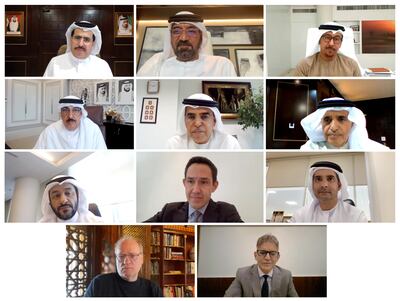The Dubai Supreme Council of Energy has approved updated plans to reduce carbon emissions by 30 per cent before the end of 2030, in a move aimed at supporting the UAE’s efforts to achieve the country's net-zero ambitions by 2050.
In line with the emirate's goals to increase the share of clean and renewable energy sources and achieve Dubai Net Zero Carbon Emissions by 2050, the council reviewed the plans and road map to implement the strategy using the latest technologies, Dubai Media Office said in a statement on Sunday.
"The council has started evaluating carbon emissions for the next 10 years, in collaboration with the relevant organisations in Dubai to come up with the required measures to reduce emissions," said Saeed Mohammed Al Tayer, vice chairman of the Dubai Supreme Council of Energy.
The emirate is seeking to diversify its energy mix through the Dubai Clean Energy Strategy 2050 and its carbon neutrality strategy 2050, to obtain 100 per cent of its energy from clean sources.
The UAE, the Arab world’s second-largest economy, has planned renewable energy investment worth Dh600 billion ($163.37bn) over the next three decades.
Dubai is also undertaking clean energy projects, including the 5,000-megawatt Mohammed bin Rashid Al Maktoum Solar Park, which is the world’s largest single-site solar park. The fifth phase, with a total investment of Dh2.05bn, is 60 per cent complete, said the Dubai Electricity and Water Authority.

The Supreme Council of Energy also reviewed programmes carried out by various bodies under its umbrella in electricity and water production, industries, waste management and land transport to reduce carbon emissions.
These resulted in "significant reductions" during 2020 and 2019, authorities said.
The council also approved a regulatory framework for cooling service providers and customers to ensure the effectiveness of permit issuance and billing.
The meeting also discussed the successful launch of Dewa-Sat 1, part of Dewa's Space-D programme, that was launched in January 2021. Dewa is the first utility in the world to use satellites in its operations.
"Space-D aims to improve the operations, maintenance and planning of Dewa's networks with the support of nanosatellite technology, Internet of Things and remote sensing technologies," Mr Al Tayer said.
The Dubai nanosatellite is designed to improve the emirate’s utility network.
"The programme shows how Dubai’s leadership is taking advantage of Fourth Industrial Revolution technologies such as IoT, artificial intelligence and blockchain to exchange information with the help of satellite communications and earth observation technologies,” Mr Al Tayer said.
The council also reviewed participation in the fourth edition of the Emirates Energy Award, which highlights the best existing practices in the areas of clean energy, energy efficiency and sustainability in the region, according to Ahmed Buti Al Muhairbi, secretary general of the Dubai Supreme Council of Energy.
Winners of the fourth Emirates Energy Award will be announced in October.


